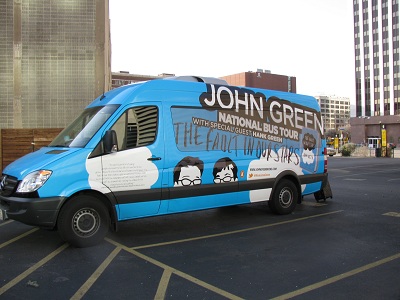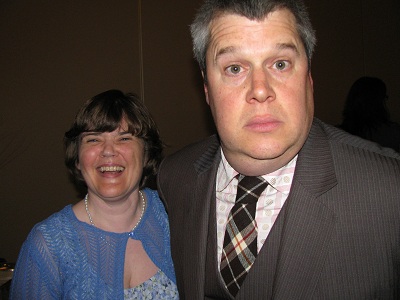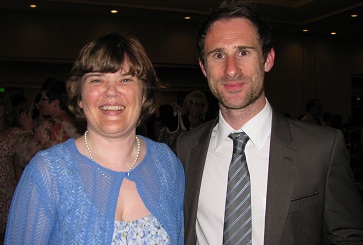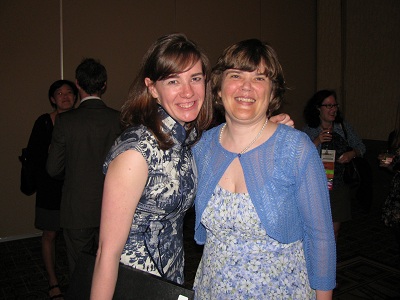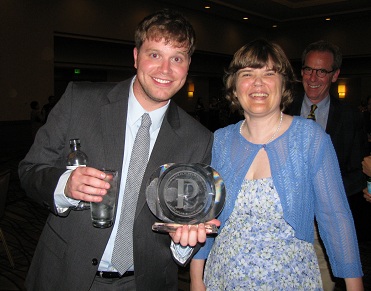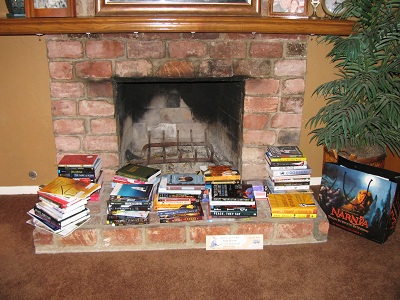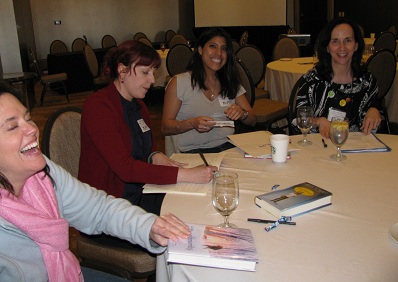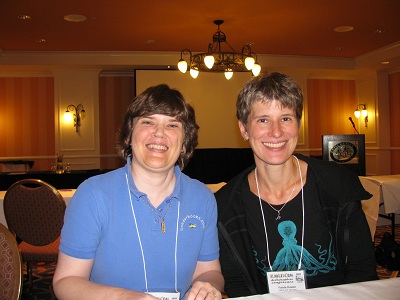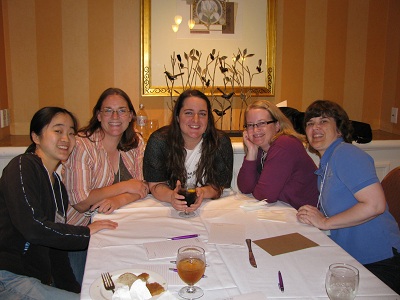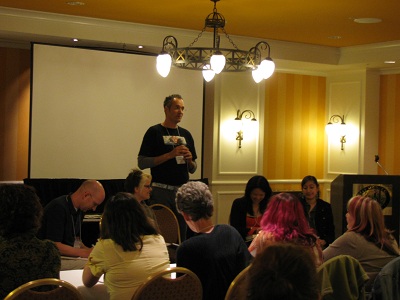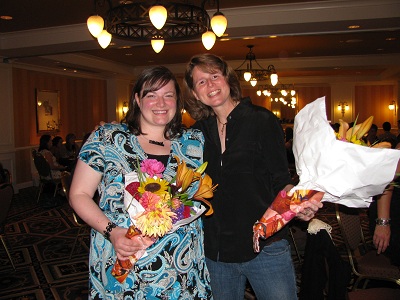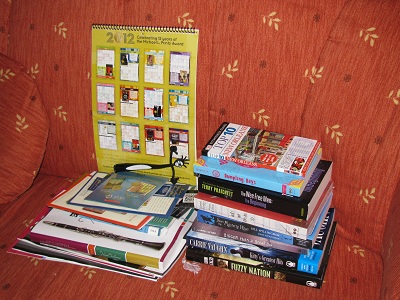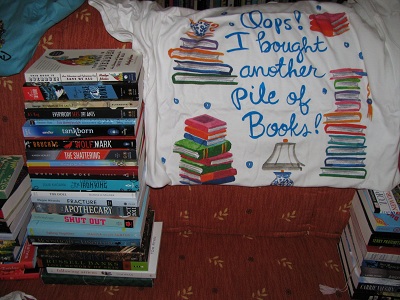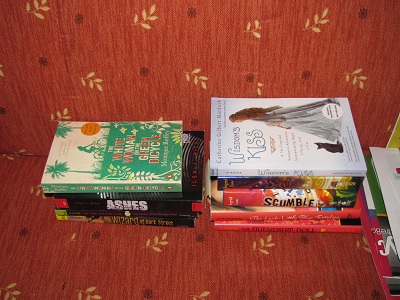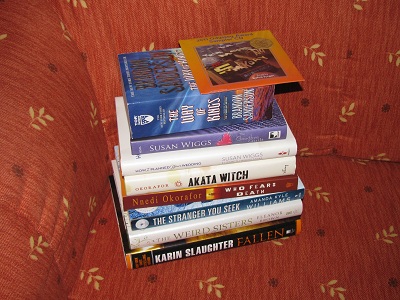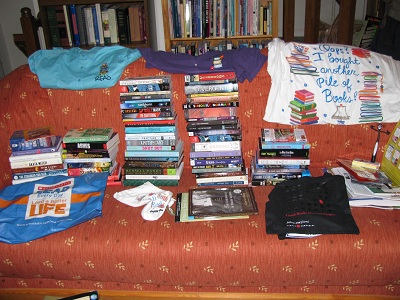Monday night, my last night at ALA Annual Conference 2011, @LizB tweeted, asking if anyone knew a good place to eat before the Printz Awards. @foodandbooks answered that the Palace Cafe is a good one, and I asked Liz if I could join her, and I tweeted to my roommate, @inked2ways, and it actually worked! Liz, April and I met up (tweeted up?) at the Palace Cafe and had a delicious dinner before the Printz Awards and a great time talking.
One thing I love about the Printz Awards is that ALL the honorees give a speech, not just the big winner. Also, it is not limited to American authors, but is for any distinguished books for young adults published in the last year. This year, that meant a lot of delightful accents to listen to!
I thought it was a bit ironic that the Printz Awards happened the same night Megan Cox Gurdon of the Wall Street Journal posted another follow-up to her article that caused a stir, claiming YA is horribly dark. (Okay, I’m linking to my post about it, not to her post — It’s gotten enough attention.) The fact is, all the books honored are indeed dark. But they are outstanding books. And the speeches all pointed out so many reasons why they are powerful books, and truly worthy of celebrating.
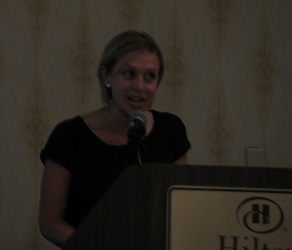
First up was Lucy Christopher, with her utterly adorable accent. She now lives in Wales, but moved to Australia when she was 6, so I’m not sure exactly how to categorize her accent. I only know it was fun to listen to! Her Honor Award was for her debut novel, Stolen. It was kind of mean to have the debut author go first! Though the order is determined alphabetically, so no one intended to be mean. How brilliant to win such an honor with her first book!
Her speech was fabulous! She talked about researching her book. She traveled to the Great Sandy Desert, which she says is aptly named. Among others she thanked, she thanked the “bemused customs official” who let her bring orange sand from the Great Sandy Desert to New Orleans. She’s never felt so close to something so wild.
She made the same comment Karen Slaughter made about Southern writers at the Author Gala Tea: She had to turn to books because the library was the only air-conditioned place when she was growing up.
She wanted to get across the emotions of fear and excitement, alienation and yearning, because those emotions define a teenager’s world.
Her message: “Be brave.”
All writers are immigrants.
Books help young people be brave.
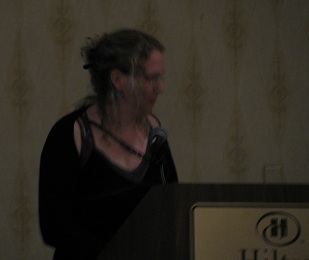
A. S. King was up next, honored for her book, Please Ignore Vera Dietz. She had the audience practically in tears as she described how, when she was a teenager, her mother died in front of her and was revived by hospital staff, but then was in danger for the next several months. (We cheered when she said that her mother is still alive today. But she didn’t know that would be true when she was a teen.)
She came right up front talking about the issue of darkness in books. She said, “Great satire begins in a place of darkness.”
Adults are important in teens’ lives, but “There IS no bubble to grow up in.”
Adults would like to keep their teens in a bubble, but “teens know that the rainbow-colored bubble doesn’t exist.”
“If we’re supposed to ignore everything that’s wrong, how are we supposed to make it right?”
As she talked about her own mother and how they discussed books, she gave us a magic question to use on our teens: “What do you think about that?” Use it on the news, on books, on injustices you see around you. You’ll get some answers that surprise you, and your teens will come to understand that you respect their thinking.
The fact is, we try to build our own bubble as we grow up. There are things adults don’t want to talk about. “Now what do you think about that?”
“Our time on earth is too short to ignore reality.”
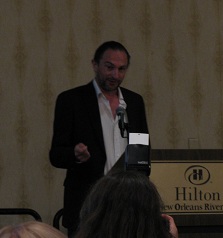
The next speech was by the handsome and dashing Marcus Sedgwick, who had a melting deep voice with a British accent. He told a story about trying to be suave and having a glass of wine spill in his lap the first night of the conference, and all us ladies were thinking that it didn’t matter what happened to him, the moment he opened his mouth and talked, he was suave as far as we were concerned! (My notes just say “Incredible accent!” I find I remember what that means.)
He was being honored for Revolver, an unquestionably “dark” book. It was his tenth book, but the first where the feeling in his head got down on paper. He went to the Arctic part of Sweden to research the book. He told about walking on the ice gingerly — until they heard Volvos driving around.
He said he’d heard about the kerfuffle about dark YA on our side of the Atlantic and that it happens regularly over there, too. He thinks it’s much more to the point to get children reading at all.
He was subtle about the violence in his book — but he did that because it’s better writing, not because he thought young people couldn’t handle it.
“We run the risk of underestimating teenagers.”
“We all go through being a teenager and then run away as fast as we can.”
And I love this question, perfect for the “Darkness in YA” discussion:
“What better place is there to address tough issues than a thoughtfully written book?”
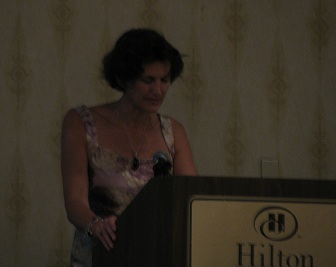
Janne Teller, author of Nothing, gave the final Honor Book speech. She had a lovely Danish accent. She tried to apologize, telling us that she only speaks through stories, and then gave an outstanding speech. She said that being from Denmark, getting recognition from America was a fiction itself.
She always writes about things she doesn’t understand and learns through story.
In Nothing, the teens in the story become fanatics in their search for meaning.
“All the largest questions in life are very simple.”
“Teenagers ask these questions that adults can’t answer.”
She did get some strong opposition to her book when it was first published in Denmark eleven years ago. She said that the kids, unlike some adults, see that the book is about hope and light even though it’s dark.
“This is a tough time to be human, especially for young people.”
“Young adults can take everything, much more than adults. That’s our hope for the future.”

Finally, Paolo Bacigalupi, the winner of the 2011 Printz Award for Shipbreaker gave his speech. He was particularly pleased that a science fiction book won this honor. (I’m with him here!) His father introduced him to science fiction, and it was his gateway drug to reading. “Genre fiction was my crack and I smoked a lot of it.”
“Literature and ship-to-ship battles can coexist.” (Yes!)
“Science Fiction asks big, important questions. These questions are worth asking!”
Yes, he wrote about a dark, bleak future. But he’s only going to be wrong if people face reality to come up with solutions.
“You need to get past PR Orcs.”
“As wealth increases, empathy decreases.”
Then he started talking about how stupid and short-sighted people are to cut library funding. (You go, Paolo!)
“The rich hoard information as well as wealth.”
“Dysfunctional and ignorant democracy is a great place for wealthy people.”
“We’ve decided to fund our present wars rather then affirm our future prospects.”
“Librarians are at the dikes holding back the tide of ignorance.”
“Wither our libraries go, our society goes.” (Preach it, Paolo!)
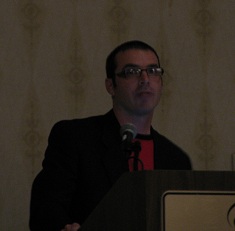
After getting completely jazzed up and being as proud as could be to be a librarian who works with young people, I went to the reception. I talked with many wonderful people and authors, including Nancy Werlin, whom I met last year at the Printz Award Reception, and her husband. (I am determined that next year at this time, I WILL have read her books, which I have heard great things about.)
Of course, I had to get pictures with the honorees. Here I am with Paolo:
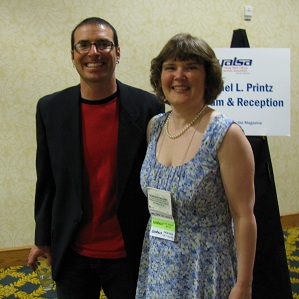
He looks happy, don’t you think?
And here’s the still-adorable-up-close Lucy Christopher:
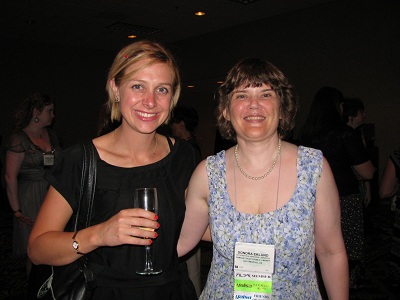
And of course I wanted to meet the dashing Marcus Sedgwick:
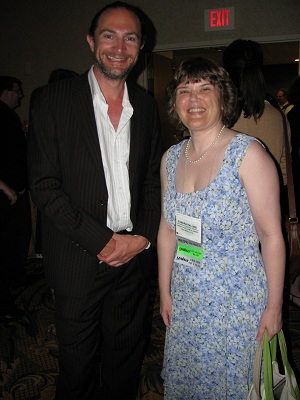
All in all, it was a fabulous way to finish up ALA Annual Conference 2011! Nice and interesting people, rousing speeches, and new books added to my hugely long I-Really-Really-Want-To-Read-That List! A lovely evening indeed.
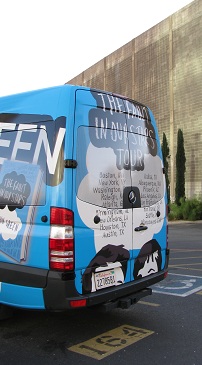 Then talking about teens: “Teens are having a lot of interesting things happen to them for the first time.”
Then talking about teens: “Teens are having a lot of interesting things happen to them for the first time.”